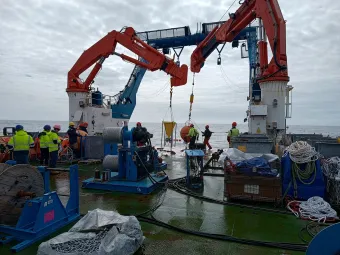
Scientists from the National Oceanography Centre (NOC) and the Scottish Association for Marine Science (SAMS) are onboard the RRS Discovery for the DY181 expedition, marking a decade of ongoing observations of a crucial part of the Atlantic Meridional Overturning Circulation (AMOC).
The expedition, part of the Overturning in the Subpolar North Atlantic Program (OSNAP) will study the AMOC component that flows through the Rockall Trough and Iceland Basin. 2024 marks the 10th anniversary of the OSNAP array data, which provides vital insights into changes in the AMOC through an international effort involving several scientists from multiple countries.
The expedition is also the first conducted under the recently announced AtlantiS programme (Atlantic Climate and Environment Strategic Science), which is exploring the ocean’s role in mitigating climate change.
The AMOC is a complex system of ocean currents that carries heat northwards towards the Arctic Ocean. It sustains mild temperature conditions in Europe compared to similar latitudes in North America. On the way north, these warm waters lose heat to the atmosphere and sink into deeper depths, carrying cold, freshwater, nutrients and anthropogenic (human-caused) carbon South.
The RRS Discovery set sail from Aberdeen, Scotland, on 3 July and will dock in Reykjavik, Iceland, on 28 July. During the expedition, scientists, technicians and crew will recover dozens of moored instruments that have been in the ocean for the last two years measuring ocean properties (such as temperature, salinity, oxygen and pH) and currents in depths between 50m and 2,800m.
Scientists will then download the data before returning the instruments to the water for another two years. During DY181, nutrients, dissolved inorganic carbon, total alkalinity and oxygen are also being measured in different depths of the ocean to give a better view of the changes in the chemical properties of the ocean.
New technologies, including lab-on-chip sensors are used in collaboration with the CHALKY project and telemetry installed in the moorings is tested in collaboration with RAPID-Evolution. Lab-on-chip aims to automate water sampling for surface carbon chemistry parameters. Telemetry on moorings will allow scientists to collect data remotely using autonomous vehicles or ships of opportunities in between mooring turnarounds, which marks an important step toward near-real-time deep ocean data and reduces the risk of data loss if the mooring cannot be recovered.
Follow more news on https://www.o-snap.org/news-events/blog and find daily updates on X, formerly Twitter by following #DY181.